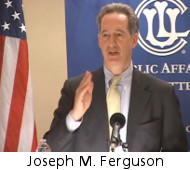Article from: www.thenewspaper.com/news/45/4539.asp
10/13/2014
Chicago, Illinois Resists Short Yellow Refunds
Inspector general for Chicago, Illinois audits red light camera program and finds lax oversight and short yellow times.
 Officials in Chicago, Illinois are doing their best to resist the increasingly loud calls for a refund of 77,000 red light camera tickets issued at intersections where the yellow warning time was illegally short. Joseph M. Ferguson, the city's inspector general, revealed on Friday that tickets were issued at intersections where the yellow time was 2.9 seconds, which falls before the bare minimum 3.0 seconds required under federal regulations.
Officials in Chicago, Illinois are doing their best to resist the increasingly loud calls for a refund of 77,000 red light camera tickets issued at intersections where the yellow warning time was illegally short. Joseph M. Ferguson, the city's inspector general, revealed on Friday that tickets were issued at intersections where the yellow time was 2.9 seconds, which falls before the bare minimum 3.0 seconds required under federal regulations.
Ferguson was tapped to examine the red light camera program after the Chicago Tribune noticed unexplained spikes in photo tickets. The inspector general found that the spikes were caused by several problems that might have been discovered and remedied had Chicago officials paid attention to what its private, for-profit vendors, Redflex Traffic Systems of Australia and Xerox, were doing.
"In this review as well as OIG's previous audit of red-light camera placement, we found that the city has historically been seriously deficient in meeting its duty to actively manage this public safety program, one which directly affects the entire city," Ferguson said. "Outsourcing to the private sector need not and should not be an occasion for benign neglect to actively manage important government functions such as the red light camera program."
Chicago's camera vendors issued 5,009,831 red light camera tickets worth $520,289,186 since 2003. Redflex pocketed $126 million from this amount, only to be swept up in an ongoing federal bribery investigation. Xerox was called in to replace Redflex earlier this year.
Chicago officials gave the go ahead for Xerox to begin issuing tickets at intersections where the yellow time was 2.9 seconds, something Redflex did not do. Officials cited National Electrical Manufacturers Association (NEMA) standards that allow 0.1 second variance on traffic controllers. This private-industry standard allows signal timing to drop as low as 2.6 seconds before a fault code is triggered.
Administrative law judges have thrown out the 2.9 second tickets saying they were in violation of binding federal regulations, regardless of NEMA tolerances. The city temporarily stopped issuing 2.9 second tickets on September 22. The city announced Friday it would end the practice permanently -- without admitting fault that would result in issuing $7.7 million worth of refunds.
"Out of an abundance of caution and to support consistency in the program, the city has directed Xerox to cease issuing violations if the measured amber time during the event is under the programmed time, even though the violations are valid and meet nationally recognized standards," Chicago Department of Transportation Commissioner Rebekah Scheinfeld wrote on Friday.
The audit report uncovered a number of other problems with the program. At the intersection of 119th Street and Halsted Street, the trigger speed for the camera dropped from 15 MPH to 5 MPH for seven weeks in 2011. That change generated $161,800 worth of tickets. At Lincoln Avenue and McCormick Road, the sensor in the turn lane only functioned intermittently, generating the spikes. At Halstead Street and Fullerton Avenue, there was a spike for two days when the traffic signal pole was damaged, making the red light impossible to see from certain angles.
When Xerox took over from Redflex, Xerox erased all the hard drives containing Redflex maintenance records, making it impossible to determine whether the settings on the cameras had been intentionally tampered with.
The inspector general recommends that Chicago put online the business rules that Xerox and subcontractor IBM use to determine who is guilty, copies of internal evaluations of the program, documentation explaining camera placement decision and anything else that sheds light on camera operations. The city agreed to make most of this information available.
A copy of the audit report is available in a 4mb PDF file at the source link below.
Source: Red Light Camera Program Review (Chicago, Illinois Inspector General, 10/10/2014)
Permanent Link for this item
Return to Front Page
 Officials in Chicago, Illinois are doing their best to resist the increasingly loud calls for a refund of 77,000 red light camera tickets issued at intersections where the yellow warning time was illegally short. Joseph M. Ferguson, the city's inspector general, revealed on Friday that tickets were issued at intersections where the yellow time was 2.9 seconds, which falls before the bare minimum 3.0 seconds required under federal regulations.
Officials in Chicago, Illinois are doing their best to resist the increasingly loud calls for a refund of 77,000 red light camera tickets issued at intersections where the yellow warning time was illegally short. Joseph M. Ferguson, the city's inspector general, revealed on Friday that tickets were issued at intersections where the yellow time was 2.9 seconds, which falls before the bare minimum 3.0 seconds required under federal regulations.